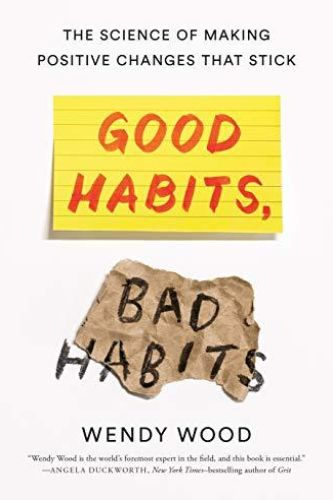Renowned psychologist Wendy Wood explains how habits – good and bad – form and how you can jettison bad habits and develop good ones.

The Science Behind Habits
Wendy Wood, PhD, is the Provost Professor of Psychology and Business at the University of Southern California. She lectures widely and has written for The Washington Post and the Los Angeles Times.
Super achievers might have extra willpower, but, says Wood, they arrange their lives to support habits that help them succeed. Habits work on autopilot in the background to promote incremental change. Wood defines habits that stick and teaches you how to build them. Her observations are sharp, and if you want to adopt helpful habits, Wood’s advice provides an effective starting point.
Wood’s approach to habits garnered widespread praise. The Washington Post said, “Wood is…a premier scientist in psychology, working on how habits affect and are affected by the human mind.” Adam Alter, of the NYU Stern School of Business, called Wood’s book, “a fascinating tour of the science of habits, and Wendy Wood is the consummate tour guide.” The New Yorker, commenting on her methods, said Wood, “… sees the task of sustaining positive behaviors and quelling negative ones as involving an interplay of decisions and unconscious factors.”
Second Self
When you make decisions and engage your will to solve problems, Wood reveals, you invoke your conscious mind, which contains executive control functions – the most important components of change. Most people believe that changing behavior depends on willpower, but Wood stresses that habits can undermine conscious choices. She notes, however, that habits also free your executive decision-making function so it can focus on problem solving.
Skip the debate chamber, and get to work. That’s exactly what habits are for.Wendy Wood
Good habits and bad habits, Wood establishes, start the same way, and 43% of all behaviors are habitual.
Knowledge doesn’t have much impact on habits, but distractions do, and can interrupt a habit. Wood cites stimulus control – removing yourself from proximity to something that tempts you to break your resolve – as a way to support self-control.
Context Cues
Wood cautions that your environment and context cues exert unseen forces that affect your behavior. Just as people often ignore the knowledge that eating fruits and vegetables is good for you, the knowledge that cigarette smoking damages your health didn’t dissuade people from smoking. Watching someone else smoke, Wood reveals, might be a driver for you to smoke. Netflix, for example, depends on drivers that keep you binge watching.
Automatic Behavior
Automatic behavior increases with repetition. Needing 21 days to set a habit, Wood insists, is a myth. She explains that simple habits take less time to master than habits with multiple parts. And, Wood reports, you must fend off old habits to develop new ones.
Uncertain Rewards
Unexpected rewards trigger the release of dopamine in the brain, a pleasurable experience. Wood recounts that the release of dopamine sets up the new neural pathways necessary to form habits. The reinforcing effects of dopamine are strongest when rewards come as part of an action. Intrinsic rewards, Wood reminds you, make new behaviors easier to embrace and build into habits. Longer-term negative incentives, she clarifies, don’t work to form new habits.
A well-chosen reward is like a really solid, steady investment.
Wendy Wood
When you ingrain a habit so deeply you no longer notice it, rewards become irrelevant. Wood makes it clear that habits – good and bad – persist without rewards.
Swapping Behavior
When you repeat a sequence of behaviors the same way consistently, Wood teaches, your brain chunks them together as a unit. She recommends swapping behaviors, such as reaching for bottled water instead of a sugary soda.
She also urges you to reduce warring with yourself to accomplish your goals. People with seemingly high levels of self-control, she reveals, have habits that make their goals easier to accomplish.
Stress
Overthinking leads to anxiety. Wood believes anxiety impedes forming new habits. Those CEOs who are under the most stress, she reports, stay stuck in old, habitual patterns.
Your beneficial habits will keep grinding forward, ignoring the drama of the day.Wendy Wood
A bad habit taken to extremes results in addiction. Habits relieve the conscious mind from making repeated decisions over time, but, Wood underscores, addictions demand more and more conscious attention.
Exposure Effect
Doing something repeatedly, Wood explains, provides a sense of fluency, of being experienced at that task. The activity is comforting because it’s familiar.
Habits, it turns out, are a two-way street. They achieve our goals, and they become our goals, too.Wendy Wood
Wood insists that people overestimate the power of willpower and underestimate the power of habit. Aligning the two will help you achieve your goals more easily. When you align habits to support your goals, Wood avows, you accomplish more with less effort.
World Between
Wood writes with ease, and her ideas are accessible to all, even though she’s careful always to include the scientific underpinnings of every tactic or method for dealing with habits that she suggests. What makes her word so valuable – and what brought her such positive reviews – is that Wood operates in a world between hard science and straight-up self-help. She supplies a credible mental, psychological or emotional reason – backed with the appropriate science – for each of her suggested ways to change your behavior.
Even though Wood states firmly that knowledge does not affect habit – remember, people do keep smoking even when they know it will kill them – she presents fascinating knowledge to help you accept her advice. And you will, especially if you are trying to break bad habits or establish healthy ones. In that case, Wood’s guidance will prove a great boon.
Among the many books on habits, these offer worthwhile companion reading: Habits by Dr. Hayden Finch; 5-Minute Self-Discipline Exercises by Christine Li, PhD; and Willpower by Roy. F. Baumeister.













